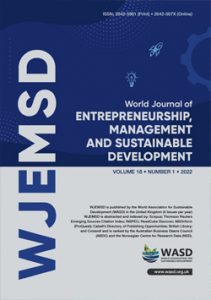Consumers of organic food and sustainable development in Brazil, Prof. Danilo Sampaio and Prof. Marlusa Gosling
Prof. Danilo de Oliveira Sampaio
Faculty of Administration (CAD)
Federal University of Juiz de Fora, Minas Gerais
Brazil
Prof. Marlusa Gosling
Centre for Graduate and Research Administrations (CEPEAD), Faculty of Economic Sciences
Federal University of Minas Gervais (UFMG), Mias Gerais
Brazil
Email: danilo.sampaio@ufjf.edu.br
DOI: 10.1108/WJEMSD-08-2013-0045
Purpose: The purpose of this paper is to investigate the reasons why the Brazilian consumer of organic foods chooses this type of food in the retail sector, considering sustainable development.
Design/methodology/approach: This was a descriptive study including an exploratory phase. Regarding the methods of research, two focus groups (FGs) were developed in the qualitative phase, and then structural equation modelling was used by means of a cross-sectional survey in a quantitative design. The sample was non-probabilistic, intentionally non-random, for convenience and accessibility (n=560). Organic food consumers were addressed in different types of food retail: supermarkets, restaurants and specialised retailers.
Findings: Only one of 12 hypotheses was not confirmed. The FGs provided important information for the development of the questionnaire used in the survey. The endogenous construct, intent to purchase, showed a correlation coefficient of 41 per cent (R2=41 per cent), indicating that 41 per cent of their variations are explained by the exogenous constructs. It can be considered that one of the academic contributions of this research was to develop a model that will drive how the purchasing behaviour/consumption of organic food in Brazil occurs.
Practical implications: Considering the results of the variables of this research, retailers can create advertising campaigns that have an appreciation for the environment and quality of product and availability (logistics) in relation to organic food as the message content, because these variables can motivate the purchase. It is also suggested that the layout of the sales area in the retail premises highlights the organic food on the shelves, and the retailer's job could define the associations to the brands of organic foods, focusing on health and well-being.
Originality/value: As in Brazil there is little information on the behaviour of organic food consumers, the creation of a new model will assist entrepreneurs in their strategies and highlights a type of food that meets the principles of sustainability.
Keywords: Consumer behaviour; Brazil; Sustainable development; Retail; Organic food; Healthcare.
Citation: de Oliveira Sampaio, D. and Gosling, M. (2014), "Consumers of organic food and sustainable development in Brazil", World Journal of Entrepreneurship, Management and Sustainable Development, Vol. 10 No. 1, pp. 77-86. https://doi.org/10.1108/WJEMSD-08-2013-0045

